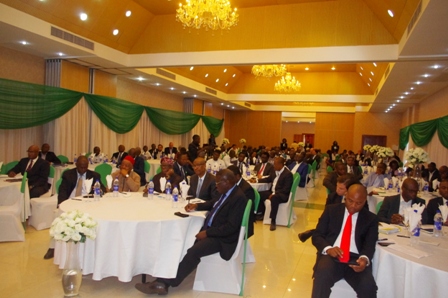Owners of Nigerian Automobile Assembly plants that fail to add at least 20% local content within next three years may face stiff penalty, the Federal government has hinted.
Mr Farouk Umar, Policy and Planning Director of National Automotive Design and Development Council (NADDC), gave the warning in Abuja on Thursday during the Auto Industry Stakeholders’ Meeting for Review of Draft Automotive Policy and NAIDP organised by the Ministry Industry, Trade and Investment and NADDC.
Mr. Umar, who announced a proposed 100 per cent import tariff for Fully Built Units (FBUs) and 125 per cent for used cars, assured that the National Automotive Industry Development Programme bill, when amended, would include the positions of all stakeholders that aligned with the NAIDP development objectives.
It would be recalled that the Federal Government in November 2013, raised duty and levy payable on imported new and used cars from 20 to 70 per cent, and zero per cent on imported completely knocked down (CKD) units needed by local assembly plants.
However, according to him, while the proposed further tariff increase is meant to protect local assemblers and encourage patronage of made-in-Nigeria vehicles, auto assemblers that fail to meet 20% local content within three years shall lose the said tariff incentives and be made to pay increased tariffs.
‘’Failure to comply with the above provision,’’ he warned, ‘’will attract increased tariff as determined by the council. The plan should make all necessary provisions for the bicycle, motorcycle and tricycle assembly to thrive.’’
Umar said that the NADDC protection list of locally assembled vehicle should be populated with vehicles at CKD level that are able to reach an annual volume of 5,000 units.
He said it included development of a basis for determining local content contribution which would be largely based on value addition and labour fractions, and a system for yearly evaluation of same.
According to him, local assemblers will strengthen local suppliers with regards to qualitative, technological and productive aspects.
Umar, who proposed detailed global analysis of policies and practices of countries with buoyant automotive industry to ascertain the proper balance to ensure change in tariffs from time to time to boost manufacturing sector also listed other proposed amendments to the policy and NAIDP to include proper definitions for what constitutes Semi Knocked Down (SKD), and Completely Knocked Down (CKD).
‘’In order to boost local content,’’ he said, ‘’NAIDP shall include plans to ensure that all licensed assemblies achieved a 20 per cent local content inclusion target within three years from the adoption of the review.’’
Meanwhile, NADDC Governing Council, Sen. Osita Izunaso, Chairman, in his address, said the bill, which was passed into law by the nation’s National Assembly failed to get Presidential ascent due to observed short comings.
“It is therefore, our hope that the calibre of the people that gathered to deliberate on the review of these documents will bring to bear their wealth of experience in the industry to produce a solid document,’’ he said.
According to him, the NAIDP 2014-2024 plan has five critical elements that aim at addressing various challenges facing the automotive sector.
He listed the elements as infrastructure development, investment promotion, standards, skills development and market expansion.
Earlier, in an opening remark, Minister of Industry, Trade and Investment, Otrunba Adeniyi Adebayo, commended the efforts of various stakeholders involved in the process of pushing the draft bill beyond the National Assembly prior to its rejection by the Presidency.
He said:“It depicts the commitment of all key stakeholders towards improving the activities of the automotive sector and a strong reassurance of the governments’ industrialisation drive in accordance with the NIRP.’’
According to Adebayo, the NIRP was designed to accelerate industrial capacity within Nigeria to increase manufacturing’s contribution to Gross Domestic Policy (GDP) from 4 per cent to 10 per cent figure.
He explained: In many countries across the world, as witnessed in South Africa and Morocco, the automotive industry played a strategic and catalytic role in economic development.
‘’In its effort to implement the NIRP, the Federal government of Nigeria approved a new plan called the NAIDP to transform the Nigerian automotive industry and attract investments into the sector.
The minister said that the NAIDP 2014-2024 was designed to ensure growth and sustained development of the auto industry in Nigeria.
In 2016, automobiles and automotive components importation gulped about eight billion dollars while in the same year UNCTAD reports depicted that vehicle imported stood at 400,000 units.
“75 per cent of these vehicles imported were pre-owned while 25 per cent are new vehicles or Fully Built Units (FBU), he said.
The stakeholders’ dialogue was organised by the Ministry of Industry, Trade and Investment, in conjunction with the NADDC to gather stakeholders input for a comprehensive review of the draft bill.
The Draft Automotive Bill was passed by the National Assembly in 2018 and presented to the Presidency for consideration and assent, but was returned to NADDC due to several issues raised by key stakeholders.





